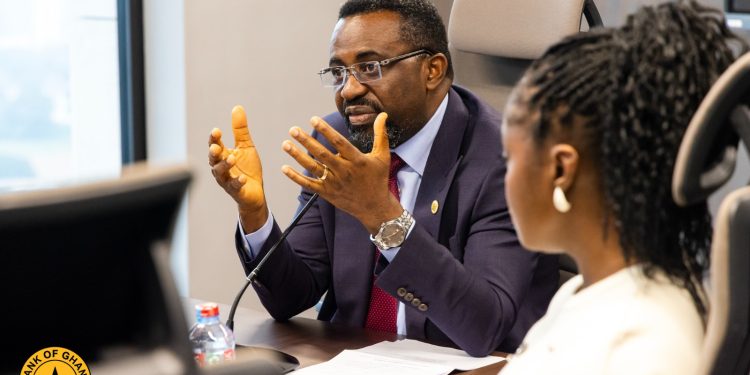BoG Governor Urges Banks to Rethink Business Models as Interest Rates Decline
Governor of the Bank of Ghana (BoG), Dr. Johnson Asiama, has advised commercial banks to urgently reassess their business models to align with a changing macroeconomic environment, warning that the prolonged era of high interest rates is no longer sustainable.
“It is now time for the banks to begin reviewing these strategies not only to protect margins, but also to serve the broader economy,” Dr. Asiama stated at the inauguration of the Bank of Ghana Chair in Economics and Finance at the University of Ghana, Legon.
His remarks form part of broader efforts by the BoG to enhance the banking sector’s role in economic transformation, especially by encouraging productive lending to Ghanaian enterprises and fostering long-term resilience in the financial system.
The Governor also stressed the need for the sector to become a catalyst for economic growth, urging financial institutions to increase support for productive sectors of the economy.
Exchange rate credibility and monetary stability
On the issue of exchange rate management, Dr. Asiama called for honest discourse around the divergence in exchange rate regimes across economies, advocating for frameworks that are “transparent, rules-based, and credible.”
He further underscored the evolving responsibilities of central banks in modern times, noting that, “Central Banks must balance price stability with financial stability, while navigating increasing government reliance on domestic financing.”
Reiterating sentiments expressed during the recent Monetary Policy Committee (MPC) press briefing, Dr. Asiama disclosed that interest rates have already begun to drop, with indicators pointing to a further decline—signalling a potential shift in the monetary policy landscape.
Managing global shocks with domestic discipline
Touching on Ghana’s macroeconomic performance, Dr. Asiama lauded the policy coordination between the central bank and fiscal authorities, underpinned by support from the International Monetary Fund (IMF).
“We cannot always prevent global disruptions, but we can control our response,” he noted, citing the Ghana cedi’s 42% appreciation year-to-date and the over US$11 billion in international reserves as evidence of disciplined macroeconomic management.
BoG–UG partnership to nurture next-gen economists
The Governor also highlighted the BoG’s renewed collaboration with the University of Ghana through the inauguration of the Research Chair in Economics and Finance—a strategic initiative aimed at developing future leaders in public policy, economics, and finance.
“This is a longstanding relationship between two institutions with shared responsibility for national development,” Dr. Asiama remarked.
The initiative is expected to identify and nurture exceptional university graduates by offering scholarships, internships, and policy immersion programmes to prepare them for global leadership in economic and financial policymaking.
Going forward, the partnership will also launch joint research initiatives in areas such as inflation targeting, exchange rate management, digital finance, regulation, and monetary policy transmission, all aimed at strengthening Ghana’s financial architecture.








